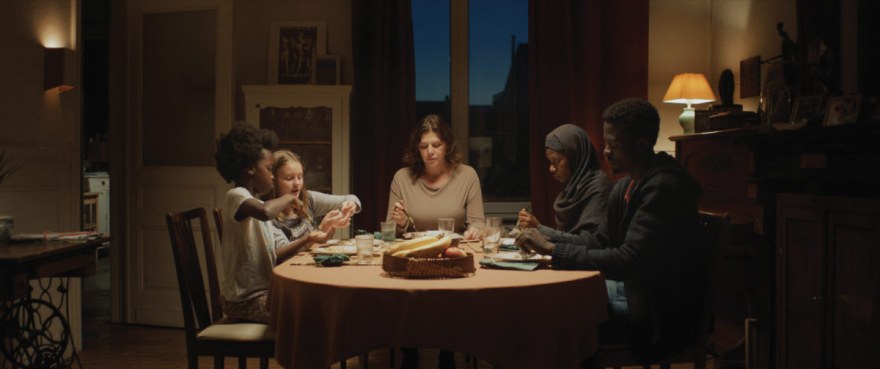Lunch with Famille [Family]
Interview with Catherine Cosme, director of Famille [Family]
Famille delicately deals with ideas of opening up, of generosity, but also with sacrifice and irrational fears of the unknown. Where did the idea for the film come from?
The film came about when we hosted families at our house. It was in the winter of 2015 and at the time the Red Cross was the only organization helping out. With the huge influx of refugees to Brussels, one night I went to the Red Cross and found all these families. I couldn’t stand the idea of being warm at home with my husband and daughter. On the spur of the moment, I went out there. Our closest friends and family were impressed, but still hesitant to do the same and asked us sometimes intrusive questions, even if they meant well. I also saw a video of this woman in a camp in Idomeni who asks the journalist who’s interviewing her to take her child before she heads back to Syria. That sacrifice on live television left a deep mark on me. And my mother passed away that year too. Throughout the final stages of writing, right up to shooting, I had a strong feeling of being abandoned.
Communication is almost non-existent between the two families who do not speak the same language. And yet the viewer has the feeling that the two mothers understand each other without speaking. Is that in fact what we’re meant to perceive?To tell the truth, that wasn’t the explicit intention. I didn’t tell them to go in that direction. I wanted to have Lisa listen to the family talking in front of her, without understanding the meaning of everything being said. At the same time, in the bath scene, something of what you mention is going on, in that very intimate setting. Having lived through it, the two mothers understand each other beyond words, and I’m happy that viewers can feel that in the film.
Does your work as a set designer for the theater affect your shots, especially the still shots and face shots that recall the experience on stage?
Yes, there was some of that in Les Amoureuses [Women In Love] (her previous short film – editor’s note). I like that gaze, that down time where the viewer can experience what is happening and have time to take it in.
Your previous short film, Les Amoureuses, was very successful. As a Frenchwoman living in Belgium, what do you think about the level of visibility of short films in Belgium and France?
Well, I’m about to find that out in France! Les Amoureuses did not play at many festivals in France, apart from Brest! So I hope Famille has a long festival circuit here in my home country as well as elsewhere – How about Africa! There are many great things happening there too. I was on the jury at the Brest festival this year. It was great to see all the films – it’s enriching and deep. It would be great to keep it going! For all the viewers and filmmakers.
Have you discovered any advantages that the short film form provides?
Teamwork! Those are my favorite moments, since the technicians are there because they love the project. Those are strong moments. No one’s in it for the money, we’re there to make a story together. In short films, you choose people you like and who you’d like to share your writing with.
Famille is part of National Competition F1.









